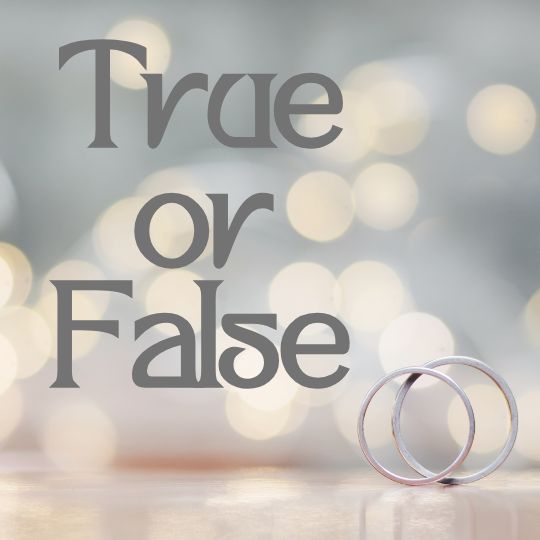10 Things We "Know" about Getting Married that Ain't So
Categories: | Wedding Legals | Wedding Planning |
 One of
my all time favourite quotes comes from a long-dead
American writer, Charles Farrar Browne, better known
under his nom de plume, Artemus Ward.
One of
my all time favourite quotes comes from a long-dead
American writer, Charles Farrar Browne, better known
under his nom de plume, Artemus Ward. 'It
ain't so much the things we don't know that
get us in trouble.
It's the things we know that ain't so.'
In wedding land there are a lot of common beliefs that
just aren't true! At least, not in Australia. Here are
the ones that trip people up most frequently.It's the things we know that ain't so.'
- Marrying an Australian citizen or permanent
resident guarantees the same. NOT TRUE.
While Australia is one of the easiest countries in
the world to get married in - you don't need a
special visa, any permissions (as long as you are
both 18), blood tests, period of residence before
the wedding, or even to alert a government
department to the fact you intend to get married,
and you don't have to be an Australian citizen or a
permanent resident of Australia to legally marry
here, if you wish to stay in this country after you
are married, you have to go through a process that
assesses whether you qualify to be a resident. You
can find marriage visa information on the Department
of Home Affairs website, if you hope to live
in Australia after your marriage.
- Being pregnant, or being on a visa that is about to expire will qualify you to get permission to give less than the required full calendar month notice of your intended marriage. NOT TRUE. there are ONLY five very precise grounds on which you can apply for Shortening of Time and pregnancy and expiring visas are not on that list.
- You have to be in Australia in order to give notice of your intended marriage. NOT TRUE. I have heard stories of couples spending thousands of dollars on air fares to make a totally unnecessary trip to lodge the Notice. Your signatures can be witnessed overseas and you can then send the Notice to your celebrant. As long as your celebrant receives your properly signed and witnessed Notice at least a month before the wedding, it's legal.
- Anyone who can witness a Commonwealth Statutory
Declaration can witness a Notice of
Intended Marriage. NOT TRUE.
There are two very short lists of people who can
witness the Notice (on page 4 of the Notice). List
(a) is of the people who can witness your signatures
if you are signing in Australia. List (b) is of the
people who can witness your signatures if you are
signing outside of Australia.
- Justice of the Peace certified copies of ID documents, birth certificates, and divorce or death certificates are acceptable proof when getting married. NOT TRUE. And if that is all you present you cannot be married. You must show your celebrant original documents (which means a document as issued by a relevant government authority, not a photocopy certified by a JP).
- An overseas marriage can be registered in Australia. NOT TRUE. While Australia recognises legal overseas marriages that also comply with Australian law, your marriage won't be registered in this country. So you need to keep your official certificate safe!
- Blood relatives can't be witnesses to your
wedding. NOT TRUE. They can. And so
can people who are friends or strangers
- Witnesses must be Australian citizens. NOT
TRUE. Your witnesses can be anyone as long as
they are at least 18 years of age and can understand
what is going on. They don't have to live in
Australia, either.
- If language is a problem, one of the marrying couple can translate during the ceremony. NOT TRUE. One of the parties to the marriage cannot translate. The interpreter must be independent.
- Signing the Notice of Intended Marriage is a binding contract, so it is OK to surprise one of the marrying couple when it comes to the day and place of the ceremony. NOT TRUE. The Notice of Intended Marriage is just that - notice of your intention. It is not a contract. And your celebrant has to be sure that you consent at every stage of the process, which means, no surprises for one or both of the marrying couple.
Thanks for reading!
